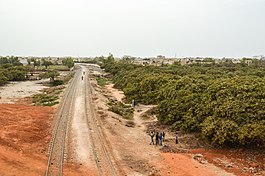Petit train de banlieue
This article needs to be updated. (November 2019) |
| Petit train de banlieue | ||
|---|---|---|
 The PTB line near Thiaroye. | ||
| Overview | ||
| Termini | Dakar Thiès | |
| Stations | Dakar, Hann, Thiaroye, Rufisque, Bargny, Thiès | |
| Service | ||
| Type | Commuter rail | |
| Daily ridership | 25,000[1] (2013) | |
| Technical | ||
| Track length | 80 km (49.71 mi) | |
| Number of tracks | Double track between Dakar and Thiès[2] | |
| Track gauge | 1,000 mm (3 ft 3+3⁄8 in) metre gauge | |
| ||
The Petit train de banlieue (PTB) is a passenger train providing regular commuter rail service between the and Thiès via Thiaroye and Rufisque.
History[]
In December 1987, the service was started under the name "Petit train bleu" (Little Blue Train) by the Société nationale de chemins de fer du Sénégal (SNCS). The train ran 10 times per day (12 times according to the Senegalese Government)[3] between Dakar and Thiaroye. This augmented to 22 runs per day in February 1988, 36 in December 1990, and 38 from 1992.[3][4]
On June 2, 2003, the Petit Train de Banlieue was created as a société anonyme owned by the state.[3] It is nowadays heavily used and served almost 5 million passengers in 2009.[5]
In addition to the Dakar–Rufisque line, the PTB runs services between Dakar and Thiès.[3]
2015[]
In 2015, the Government announced plans to build a new parallel electrified standard gauge line called Train Express Regional as far as Diamniadio, 36 kilometres from Dakar.
This will be followed by a 19km branch to the Blaise Diagne International Airport, near Ndiass. [6]
Statistics[]
| Year | Passengers | Change |
|---|---|---|
| 2006[7] | 3 037 917 | |
| 2007[8] | 4 587 042 | +50,1% |
| 2008[5] | 4 154 225 | -10,4% |
| 2009[5] | 4 920 516 | +18,4% |
| 2010[7] | 3 811 189 | -22,5% |
See also[]
References[]
- ^ "Little Train of the Suburbs dodges Dakar's traffic nightmare". 29 August 2013.
- ^ Les services et infrastructures de transports, ch. 3[dead link]
- ^ Jump up to: a b c d "Petit Train Bleu (PTB)". Senegalese Government. Archived from the original on 2014-01-12. Retrieved 12 January 2014.
- ^ Diallo, Mamadou (1989). Le Sénégal: Géographie physique, humaine et économique; études régionales (in French). Paris: EDICEF. pp. 75–77. ISBN 2-85069-526-2.
- ^ Jump up to: a b c "Situation Economique et Sociale (Édition 2009)" (PDF) (in French). Agence Nationale de la statistique et de la démographie. 6 January 2011. p. 169. Archived from the original (PDF) on 27 July 2011. Retrieved 21 February 2011.
Le Petit Train de Banlieue a transporté 4 920 516 voyageurs en 2009 contre 4 154 225 voyageurs en 2008 correspondant à une augmentation de 18,4%.
- ^ The Railway Magazine, Nov. 2015, pg110.
- ^ Jump up to: a b "Situation Economique et Sociale (Édition 2010)" (PDF) (in French). Agence Nationale de la statistique et de la démographie. December 2011. p. 231. Archived from the original (PDF) on 2012-09-07. Retrieved 14 June 2012.
le nombre de voyageurs du Petit Train de Banlieue a connu une baisse de 22,5% en 2010 avec 3 811 189 voyageurs contre 4 920 516 voyageurs en 2009. [...] 3 037 917 voyageurs en 2006.
- ^ "Situation Economique et Sociale (Édition 2008)" (PDF) (in French). Agence Nationale de la statistique et de la démographie. November 2009. p. 148. Archived from the original (PDF) on 13 November 2010. Retrieved 21 February 2011.
Le Petit Train Bleu a transporté 4 154 225 voyageurs en 2008 contre 4 587 042 en 2007 correspondant à une baisse de 15,8%.
External links[]
- http://www.au-senegal.com/Le-chemin-de-fer.html (in French)
- Pictures of the train and timetables from 2005
- Mémento des transports terrestres 2007, chapitre 9 (in French)
- Metre gauge railways in Senegal